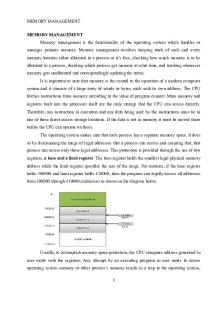Exceptional Memory - notes from lecture PDF

| Title | Exceptional Memory - notes from lecture |
|---|---|
| Course | Learning And Memory |
| Institution | Royal Holloway, University of London |
| Pages | 2 |
| File Size | 55.6 KB |
| File Type | |
| Total Downloads | 46 |
| Total Views | 157 |
Summary
notes from lecture...
Description
Exceptional Memory The mnemonists: Shereshevsky
A Russian journalist S studied by Luria from 1920 – 1950 He has a STM capacity of >70 items – the avg. person holds 7 items Able to recall lists correctly years after hearing them once
Shereshevsky synaesthesia
‘The coupling of senses’ S ‘saw’ ‘felt’ and ‘tasted’ sounds/words
Shereshevsky abilities
Recited the first stanza of Dante's The Divine Comedy It was in Italian, a language he didn’t understand Associated each syllable with a mental image – when needed to recall would recall the image which would trigger memory Luria did not distinguish between natural ability and possible use of mnemonics
Disadvantages of ‘exceptional memory’
Unable to read poetry or fiction easily Affected simple social interactions Interfered with ability to hold a regular job Made some money as a mnemonist Unable to forget S was eventually institutionalised
Professor Aitken (Hunter,1977)
Mathematician Remarkable short-term memory span Retention of learned material Exceptional recall of material learned without intent Relied on conceptual mapping Most remarkable abilities on ‘interesting’ material
Case AJ: Hyperthymesia
Could recall all her memories form teenage years to present Implicates cognitive dysfunctions – poor abstract reasoning
Superior autobiographical memory: Case HK (Ally, Hussy & Donahue,2012)
Normal intelligence and normal short- and long-term recall Increasingly accurate autobiographical memory Brain smaller than average But right amygdala 20% larger and increased connectivity to hippocampus
Disadvantages of ‘exceptional memory’
Often forgetting is seen as a bad thing – a ‘design’ flaw But… Forgetting makes traumatic and unpleasant memories less salient Forgetting helps to unclutter memory (‘pruning’)
Eidetic Memory:
Eidetic memory is not uncommon in young children It’s not found in adults. The only (extremely rare) exceptions may be some autistic savants, like Stephen Wiltshire
Eidetic Memories: Chess players
Chess masters showed 91% correct recall for chess positions, compared to 41% for less expert players (De Groot, 1965) They rely on recognition of familiar patterns and chunking Typical chess master knows ≈ 50,000 chunks (Simon & Gilmartin, 1973)
Case SF: power of chunking (Ericsson et al,1980)
SF was a college student with an average memory (memory span of 7 digits) He was trained extensively to use chunking For example, 3492 => “3 minutes and 49 point 2 seconds, near world record mile time”. This enabled him to increase his digit span to 79! His letter and word spans were no better than other people...
Similar Free PDFs

Memory lecture notes
- 2 Pages

Memory File - Lecture notes 6
- 5 Pages

Computer Memory - Lecture notes 3
- 13 Pages

Euthanasia Notes from Lecture
- 3 Pages

Lecture notes from Finance 2
- 31 Pages

Lecture Notes from entire semester
- 18 Pages

the ;lecture notes from 20202020
- 20 Pages

Lecture 7 Human Memory
- 12 Pages

Chap 7- Memory - notes
- 4 Pages

Memory Revision Notes
- 9 Pages

Notes - Memory and Cognition
- 146 Pages
Popular Institutions
- Tinajero National High School - Annex
- Politeknik Caltex Riau
- Yokohama City University
- SGT University
- University of Al-Qadisiyah
- Divine Word College of Vigan
- Techniek College Rotterdam
- Universidade de Santiago
- Universiti Teknologi MARA Cawangan Johor Kampus Pasir Gudang
- Poltekkes Kemenkes Yogyakarta
- Baguio City National High School
- Colegio san marcos
- preparatoria uno
- Centro de Bachillerato Tecnológico Industrial y de Servicios No. 107
- Dalian Maritime University
- Quang Trung Secondary School
- Colegio Tecnológico en Informática
- Corporación Regional de Educación Superior
- Grupo CEDVA
- Dar Al Uloom University
- Centro de Estudios Preuniversitarios de la Universidad Nacional de Ingeniería
- 上智大学
- Aakash International School, Nuna Majara
- San Felipe Neri Catholic School
- Kang Chiao International School - New Taipei City
- Misamis Occidental National High School
- Institución Educativa Escuela Normal Juan Ladrilleros
- Kolehiyo ng Pantukan
- Batanes State College
- Instituto Continental
- Sekolah Menengah Kejuruan Kesehatan Kaltara (Tarakan)
- Colegio de La Inmaculada Concepcion - Cebu




